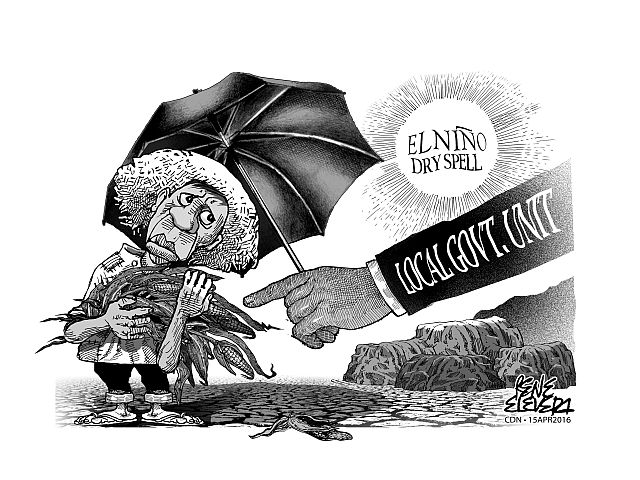When the Department of Labor and Employment starts issuing an order to employers to allow their workers assigned in the field noon breaks, clearly something’s wrong with the weather.
And it has been for sometime after the state weather bureau Pagasa declared the onset of the El Niño early last year, and except for a few spots, the weather phenomenon has been quite relentless in its severity, turning a usually cold Christmas and New Year into swelteringly, blisteringly hot year-end holidays.
It can also be recalled that the El Niño dry spell was aggravated by the forest fires in Indonesia which caused Cebu residents to don face masks for sometime before being assured by health authorities that the air, warm and hazy though it may be, was still safe to breathe in.
There were spots of haze caused this time by the ongoing volcanic activity at Mt. Kanlaon and the forest fires caused by careless campers, but if it did worsen the dry spell, its immediate area of effect covered only Negros Oriental and not the outermost parts of Cebu province where the mountain is quite visible.
The heat would have been a bit tolerable if there were strong winds to cool off the commuters and pedestrians especially in Metro Cebu, but the weather has been quite uncooperative.
Temperatures as measured by Pagasa ranged from mid-30 to late-30 degrees Celsius, but special notice should be given to the heat index which measures the discomfort level felt by the average person when exposed to outside heat.
And the heat index has displayed alarmingly high temperatures of mid-30 to even 40 degrees Celsius in some parts of the country. As environmentalists and weather analysts repeatedly point out, it only takes one degree more to raise the discomfort level to unbearable levels.
While the Department of Health has advised people to avoid going out between noon to 3 p.m., it’s best to keep oneself hydrated at all times. Drill sergeants are fond of reminding army recruits to always drink enough water until they’re ready to urinate, and this may be useful to people to at least bear the heat longer.
Owing to the belated, foot-dragging last-minute preparations of most local government units in Cebu, it is both practical and reasonable for the Commission on Elections (Comelec) to give LGUs more leeway to allocate resources to cover the losses of farmers and ensure water supply of residents living in low-water-level areas like the upland barangays.
These LGUs can avoid politicking by assigning offices to coordinate with the barangay officials and make sure that the distribution of aid give neither room nor reason for local reelectionist officials to promote their candidacies.
We still have more than a month and several days to go before the onset of the rainy season, so LGUs better start cracking and deliver assistance immediately lest more people get sick.
Disclaimer: The comments uploaded on this site do not necessarily represent or reflect the views of management and owner of Cebudailynews. We reserve the right to exclude comments that we deem to be inconsistent with our editorial standards.

